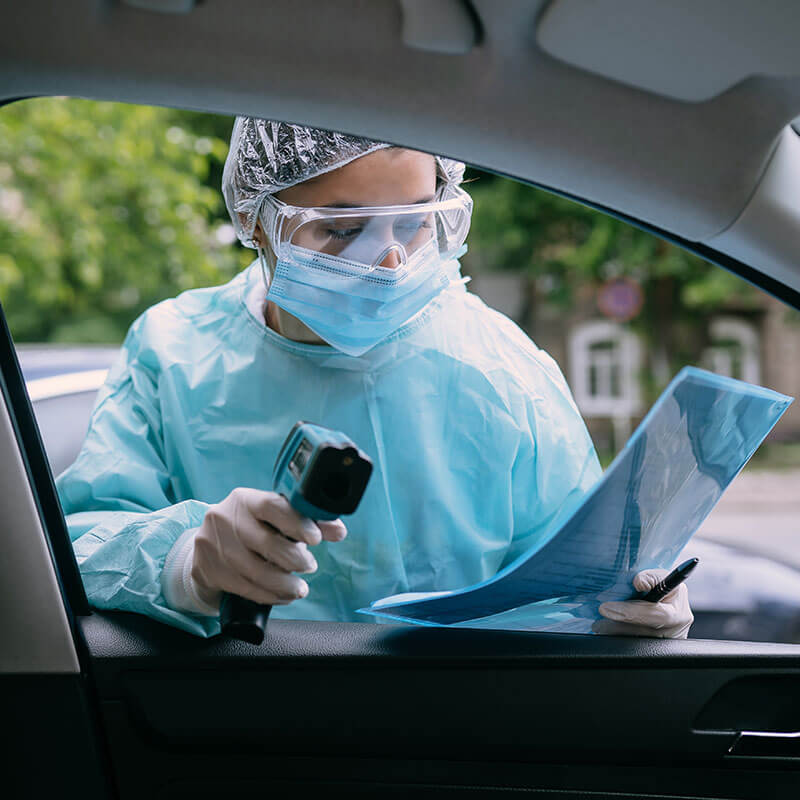Why Families Should Not Skip Pediatric Checkups Due to COVID-19
July 02, 2020
July 02, 2020

These past few months have posed much confusion across the United States and there continue to be a lot of unknowns surrounding COVID-19, but there is one thing we know for sure: this is not a time to halt well-care for our children.
Similar to the American Academy of Pediatrics’ recommendation to send children back to school in the fall, the AAP also “strongly supports the continued provision of health care for children during the COVID-19 pandemic,” which includes early intervention. The doctors we work within our own Hopebridge communities are in agreement yet understand parents’ concerns for their children’s health. These physicians are taking the guidelines extremely seriously and also want parents to know the risks of missing a wellness appointment likely outweigh the risk of coronavirus exposure during that visit.

“There are huge risks in skipping well-child checkups and it’s a real issue,” said Dr. Chris Holmes, a pediatrician for Greene County Health who specializes in behavioral health and conducts diagnostic evaluations at Hopebridge Autism Therapy Centers. “There are major things that can be missed and even a couple months difference can have a big impact. That is why our schedules with frequent visits are so precise.”
To learn more about the effects of delayed appointments and what medical professionals are doing to keep your families safe, we turned to Dr. Holmes and Dr. Candice N. Claiborne, a licensed clinical psychologist at Hopebridge who leads diagnostic assessments.
Our experts covered some of the most frequently discussed topics regarding well-visits:

The AAP, American Academy of Family Physicians (AAFP) and Centers for Disease Control and Prevention (CDC) have all been proactive in releasing guidelines for creative ways doctors can serve their patients in a safer manner for everyone involved. While every practice runs its office a little differently, most primary care facilities are following similar procedures.
“We are calling all of our patients’ families who have not made their checkups to let them know it is safe to come to our office,” said Dr. Holmes.
Protocols at most medical offices include pre-screening phone calls, no-touch temperature checks, disinfection between patients (door knobs, exam rooms, etc.), more aggressive end-of-day cleaning, and masks for every employee. Parents and patients are also requested to wear masks, though it is not always mandatory.
Physicians are taking it a number of steps further to keep their patients and themselves safe. Many reorganized their schedules to separate visits for well patients and sick patients, such as only seeing well people in the morning and those who are sick in the afternoon. Well patients or their guardians are often asked to call from the parking lot, skip the waiting room, and are escorted directly into an exam room.
At Dr. Holmes’ office, patients with any sort of illness do not even come into the building, including those with a rash or other potential viral symptoms. Instead, she and a nurse bring all the necessary instruments outside to visit them at their car or another safe area around the parking lot. When examining patients with any illness, she wears a face shield or goggles, gown and gloves, in addition to the mask. Once finished, she removes the personal protective equipment (PPE), disinfects herself and starts over again with the next patient.

“A lot of offices are following these types of procedures and parents are all for it,” said Dr. Holmes. “I also talk to my patients about COVID-19 every time they come in… ‘Are you practicing social distancing? Is everyone well in your household? Do you wear a mask when you go out?’”
Those who are significantly ill with anything that could be related to COVID-19 are asked to go straight to the emergency room. If they are a little ill and believe it’s related to the coronavirus, doctors may tell them where to get tested, ask them to stay home and the office will call with daily check-ins, giving them specific warnings about when they should not wait to get additional help. Dr. Holmes notes that accessibility and follow-up with parents is also essential during this time.
When it comes to diagnostic evaluations, the safety measures are similar with some necessary tweaks.
“I’m really proud of the procedures we put in place here at Hopebridge,” said Dr. Claiborne. “Parents are really receptive. Even if our appointments run a few minutes behind because I’m still cleaning, they are happy we took the time to prepare.”
Hopebridge’s additional methods include offering disinfectant wipes for any belongings that come into the building. Patients and parents are guided to the restroom to allow them to wash their hands before entering the testing area. Toys used for diagnostic assessments are disinfected after every appointment and at some of our centers, the “snack time” portion of the evaluation has changed a bit. When it is time for children to request food, we now use pre-packaged snacks or ask parents to bring their own, as well as have the parent direct that portion of the assessment.
Masks are recommended but not required. If a child wears a mask, there are some situations when the person conducting the evaluation may ask for permission to remove the mask if he or she cannot understand the child’s speech or needs to check facial expressions.
In order to reduce the amount of contact within Hopebridge, Dr. Claiborne also limits families to one parent or guardian inside the testing room at a time. The other parent can use FaceTime during the assessment if they would like to observe. Otherwise, Dr. Claiborne offers for parents to swap places at the end so she can talk with them one-on-one after the assessment to gather further information. Since practitioners move around the room so much, this helps limit exposure.
“We are still holding a number of telehealth visits, which can be effective for some, such as behavioral patients on medications that don’t require checks of blood pressure or weight,” said Dr. Holmes.
“Conducting a checkup for a child via telehealth is extremely difficult to do thoroughly, so I haven’t held any of my wellness visits in this manner. The younger the child, the less adequate, since you can’t pick up subtleties. Even if you have video, you can’t assess a baby’s tone if you can’t pick them up. You can’t feel their head, get an eye or ear exam, check reflexes, nor check on some cranial nerves.”

Hopebridge also conducted diagnostic assessments through telehealth during the temporary closure of our centers. This includes both the Autism Diagnostic Interview (ADI-R) to solicit information and behavioral examples from parents, as well as the play assessment with children. Before the interview, the psychologist would get an inventory of what toys were available at home and have them set up a play area. The diagnostician would give parents directives on how to guide play with the child and observe the behaviors over video.
“It was an interesting experience and we found it beneficial for a small group of families with patients between the ages of 2 and 4 years old, since the symptoms of autism are usually more apparent for this age group. It also had the additional benefit of viewing interactions with a sibling in a natural environment,” said Dr. Claiborne.
She told us as the children get older, there are more limitations. It becomes more difficult to notice their social skills and ability to pick up on social cues through a video camera and determine whether it is not better accounted for by ADHD or another mood disorder or behavioral component.
For parents wondering what they can do to help appointments run smoothly and keep everyone safe, Dr. Holmes and Dr. Claiborne shared extra advice.
“We are even busier than before with diagnostic referrals. With parents spending more time at home with their kids, it is possible they have become more aware of their children’s behaviors and challenges. It may have also given them the opportunity to put feedback from teachers or other caregivers into context,” said Dr. Claiborne.
If your child is overdue for a wellness checkup, please call your doctor to arrange an appointment. If you have developmental concerns about your child and would like to arrange an evaluation, contact us online or give us a call. Our Hopebridge team can help you get the answers you need, sooner than later.